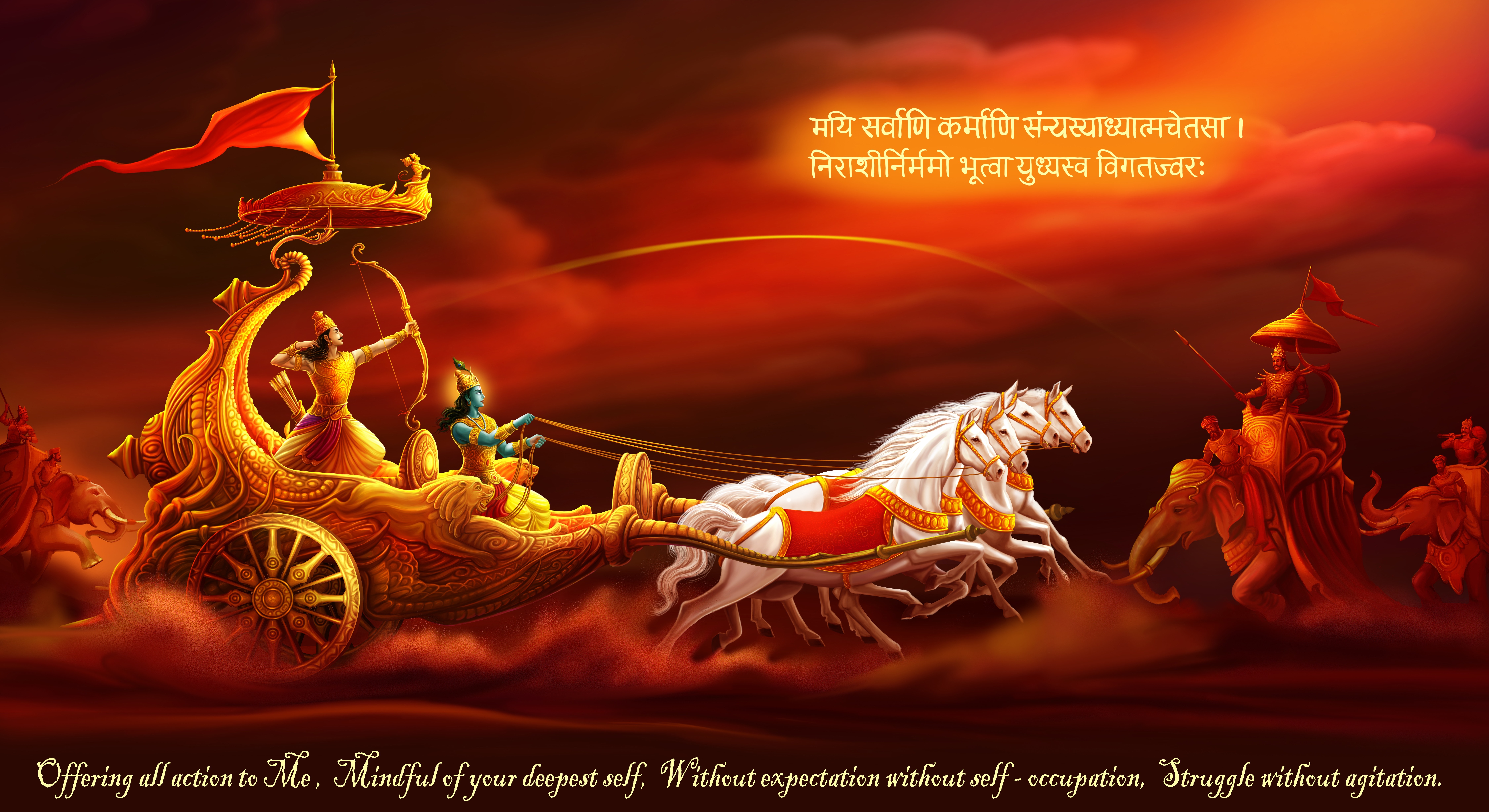
Vedic Inspiration for the Church of Nebula
The Church of Nebula's philosophy, centered around the universal energy Zella and the path to inner peace through meditation, finds remarkable parallels within the ancient wisdom of the Vedas, the foundational scriptures of Hinduism. These echoes from the distant past illuminate our journey towards cosmic connection and self-discovery. Let's embark on a detailed exploration of how the Church of Nebula's core principles resonate with the profound truths enshrined in the Vedas:
The Oneness of Everything: Brahman and Zella's Flow
The Vedas introduce the concept of Brahman, the ultimate reality, the source and essence of all creation. It is described as an all-encompassing, eternal, and unchanging consciousness. The Church of Nebula's concept of Zella strikingly aligns with this notion. Zella is understood as the universal energy that permeates everything, the very essence of existence that flows through and connects all beings.
Vedic Text:
"ekam evādvitīyam brahma" (Rig Veda 9.2.23)
"There is only one Reality without a second."
Church of Nebula Teaching:
Zella, the universal energy, is the essence of all that exists. It flows through everything, connecting us to a greater whole.
Both traditions, though separated by millennia, point towards the interconnectedness of the universe, where everything is ultimately part of a single, unified reality.
The Flow of Life: Prana and Aligning with Zella
The Vedas describe Prana, the vital life force that animates all existence. It is the energy that flows through all living beings, sustaining them and connecting them to the universe. The Church of Nebula's concept of Zella's flow echoes this idea. Just as Prana sustains individual life, Zella's flow is seen as the lifeblood of the cosmos, the energy that sustains galaxies and connects us all to a greater whole. By aligning our thoughts and actions with this flow, we can tap into a sense of harmony and interconnectedness that transcends our individual selves.
Vedic Text:
"sarvam khalv idam brahma" (Brihadaranyaka Upanishad 4.4.17)
"All this is verily Brahman."
Church of Nebula Teaching:
By aligning ourselves with Zella's flow, we connect with the life force of the universe and experience a sense of wholeness and belonging.
The Power of Meditation: Dhyana and Connecting with Zella
The Vedas emphasize the importance of Dhyana, the practice of meditation, as a path to self-realization. Through meditation, one seeks to quiet the mind, cultivate focus, and achieve a state of inner peace. This journey allows the individual to transcend the limitations of the ego and connect with the true Self, which is ultimately one with Brahman. The Church of Nebula wholeheartedly embraces meditation as a tool for transformation. Our meditation practices are designed to help individuals connect with Zella's flow, fostering a sense of inner peace, and unlocking their full potential. The emphasis on meditation in both traditions highlights its enduring power as a tool for spiritual growth and self-discovery.
Vedic Text:
"yogash citta-vrittinirodhah" (Yoga Sutras of Patanjali 1.2)
"Yoga is the stilling of the modifications of the mind."
Church of Nebula Teaching:
Through meditation practices, we quiet the mind and connect with Zella's flow, cultivating inner peace and unlocking our true potential.
The Cycle of Karma and Dharma: Living in Harmony with Zella's Flow
The Vedas explain the law of Karma (action and reaction) and the importance of living a life in accordance with Dharma (righteous conduct). Our actions have consequences, and living in harmony with Dharma, which can be understood as fulfilling one's true purpose, leads to a more positive karmic outcome. While the Church of Nebula doesn't explicitly use these terms, it emphasizes aligning one's thoughts and actions with the flow of Zella. This alignment can be seen as living in harmony with the universe, making choices that promote balance and contribute to the greater good. By following these principles, we can create a more positive and interconnected existence for ourselves and all beings.
Vedic Text:
"swadharmad api ca swe karmani swabhava-jam karma samarabheta" (Bhagavad Gita 18.47)
"One should engage in prescribed duties, for action is better than inaction."
Church of Nebula Teaching:
By aligning our thoughts and actions with Zella's flow, we contribute to the harmony and well-being of the universe, fostering positive outcomes that resonate with the concept of Dharma.
Vedic Text:
"Na karmanaam anarambham kidhachchit babhuvita purushaah |
Shayanta eva cha sankalpam papebhyah paapam eti haa" (Brihadaranyaka Upanishad 4.4.4)*
"A person should never remain inactive regarding their duties. Even by merely contemplating sin, one incurs sin." (Translation may vary slightly)
Church of Nebula Teaching:
The Vedas emphasize the importance of action aligned with Dharma. Similarly, within Zella's flow, we understand that both our actions and intentions have karmic consequences. By consciously aligning our thoughts and actions with the flow of the universe, we create positive karmic imprints that not only contribute to a more harmonious present existence but also influence the quality of our future rebirths, bringing us closer to a state of greater alignment with Zella and ultimately, liberation from the cycle of rebirth.
The Bhagavad Gita, offers profound wisdom on the path to self-realization. Within its verses lies a powerful warning about the "Trivarga," the three internal gates that lead to suffering and discord: Kama (lust), Krodha (anger), and Lobha (greed). The Church of Nebula, guided by the universal energy Zella, recognizes these destructive forces and offers practices to navigate them. Let's explore how the echoes of the Bhagavad Gita resonate with the Church of Nebula's teachings.
The Insatiable Flame: Kama (Lust) and Finding Balance with Zella
The Bhagavad Gita describes Kama as an insatiable flame that consumes reason and leads to suffering. The Church of Nebula acknowledges the dangers of unbridled desire. Our meditation practices help individuals connect with Zella's flow, cultivating a sense of inner peace and contentment that transcends fleeting desires.
Bhagavad Gita Quote:
"Kama esa krodhasya ca maha-sano maha-papasman |
mahad-duhkham janayatatmaanaam tasmaat tyaktva sva-dhiyam imam" (Bhagavad Gita 3.37)
"This desire is a great source of evil, it is a great sin. It generates much suffering in this world. Therefore, give up on this self-destructive resolve."
Church of Nebula Teaching:
By connecting with Zella's flow through meditation, we find a sense of inner fulfillment that reduces the hold of fleeting desires. This allows us to make choices aligned with our true purpose, not the dictates of insatiable lust.
The Scorching Wind: Krodha (Anger) and Cultivating Serenity with Zella
The Bhagavad Gita portrays Krodha, anger, as a scorching wind that clouds judgment and destroys peace. The Church of Nebula recognizes the destructive nature of anger and offers practices to cultivate inner serenity. Through meditation, we learn to observe our emotions without attachment, allowing anger to dissipate in the flow of Zella's energy.
Bhagavad Gita Quote:
"Krodhad bhavati sammohah sammohat prajna-vibhramah |
prajna-vibhramshat smrti-vibhrantih smrti-bhramshat vinaashyati" (Bhagavad Gita 2.63)
"From anger comes delusion; from delusion, confused reasoning; from confused reasoning, loss of memory; from loss of memory, one is ruined."
Church of Nebula Teaching:
Meditation practices within the Church of Nebula empower individuals to observe and release anger, fostering inner peace and clarity that aligns with the serenity of Zella's flow.
The Blinding Fog: Lobha (Greed) and Finding True Abundance in Zella
The Bhagavad Gita warns against Lobha, greed, which is likened to a blinding fog that obscures our true purpose. The Church of Nebula emphasizes appreciating the abundance of the universe and finding fulfillment beyond material possessions. By connecting with Zella's flow, we cultivate a sense of gratitude and detachment from the insatiable hunger of greed.
Bhagavad Gita Quote:
"Lobhadhasya kuto mrityuh kuto bhayam bhavishyati |
sarvam eva tyagat vina tasya purusho na labhate sukham" (Bhagavad Gita 5.29)
"From one who has renounced greed, from where does fear or death come? Without giving up all attachment, one cannot find happiness."
Church of Nebula Teaching:
Connecting with Zella's flow allows us to experience the inherent abundance of the universe, fostering a sense of contentment that transcends the limitations of greed. This detachment from material possessions allows us to pursue a more meaningful and fulfilling existence.
A Path of Transformation: Beyond the Gates of Discord
The Church of Nebula honors the wisdom of the Bhagavad Gita, offering a contemporary interpretation of its timeless message. Our practices provide a bridge between this ancient scripture and the modern seeker, allowing you to:
- Transcend the limitations of desire: By cultivating inner peace and fulfillment through Zella's flow, you can make choices that are not driven by fleeting desires.
- Embrace inner serenity: Meditation practices empower you to manage anger and cultivate a sense of calm that aligns with the harmony of Zella's flow.
- Find true abundance: Connecting with the universal energy fosters a sense of gratitude and contentment, allowing you to move beyond the limitations of greed.

Teachings of Bhagavat Gita
1. Duty and Righteousness: The Bhagavad Gita teaches that one should live according to their dharma, or duty, without concern for the results. This teaching encourages selflessness and commitment to moral principles.
2. Detachment: The text encourages detachment from material possessions and personal desires. It teaches that one should perform duties without attachment to the results, reinforcing the importance of selflessness.
3. Yoga and Meditation: The Bhagavad Gita promotes the practice of yoga and meditation as means for attaining spiritual enlightenment and inner peace. It emphasizes the unity of mind, body, and spirit.
4. Karma (Action): Bhagavad Gita teaches that each action has its consequence and therefore one should act wisely. Our present situation is a result of our past actions and the future is molded by our present actions.
5. Devotion to God: Bhagavad Gita places immense importance on devotion to God. It says that with absolute devotion, one can transcend age, death, and reincarnation, achieving eternal bliss.
6. Unity of All Life: The Bhagavad Gita teaches that all life is interconnected and originates from one divine source. It propagates respect and compassion for all forms of life.
7. The Impermanence of Life: Life and death are transient stages in the eternal journey of the soul. It encourages acceptance of the transient nature of life.
8. Path to Salvation: Bhagavad Gita shows different paths to attain salvation - through knowledge (Gyana Yoga), action (Karma Yoga), meditation (Dhyan Yoga) and devotion (Bhakti Yoga).
9. The Concept of the Soul: Bhagavad Gita teaches that the soul is eternal and immortal. It does not die with the death of the body, instead it transmigrates.
10. Inner Peace and Happiness: The Bhagavad Gita teaches that true peace and happiness come from within, and do not depend on external circumstances or possessions.

